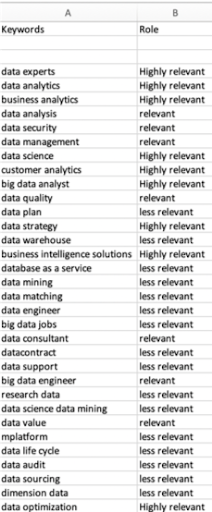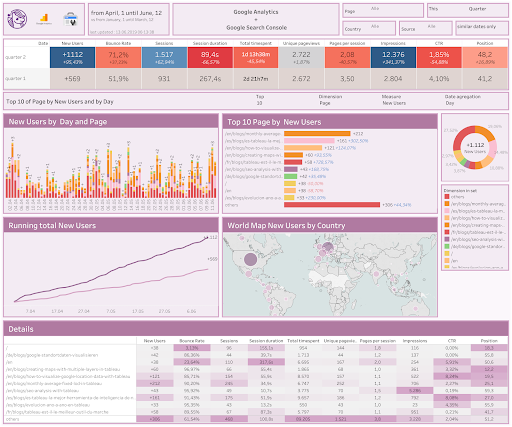Data is deeply connected to SEO and has always been a fundament of a smart ranking strategy. For SEO consultants, the need to drive traffic and revenue has caused an enormous growth in SEO analytics solutions and KPIs – making it difficult or almost impossible to keep track of them all.
Of course, having relevant data is still an essential part of effective technical SEO. But especially big projects can accumulate data masses which can be overwhelming to companies that struggle to ask the right questions.
Are you also regularly facing data overload? In this article, I’ll target all marketers that suffer from data fatigue and help them overcome a severe issue in today’s SEO.
Data overload as a natural problem in 2019
Google is more significant than most people can imagine. Every second you’ve spent reading this article at least 63.000 queries were searched on Google. This figure accumulates to 5.3 billion searches per day, 159 billion searches per month, or around 2 trillion searches every year. To provide the best search result possible to its users, it’s just logical that Google has to advance its algorithms. In mid-2019 Google takes more than 200 factors into account to determine a webpage’s ranking.
Google advancing its search algorithms makes it more and more challenging to influence a website’s ranking. This has not only lead to an increased demand for more profound data-based SEO tools, but also a hike in the number of SEO KPIs and metrics that companies have access to.
Unlike what many people think, you don’t have to keep track of them all. In fact, when marketers focus on too many KPIs, it is more likely to lead to over-optimization or just a bad headache that feels never-ending. This so-called “data overload” regularly makes marketers feel numb and overwhelmed.
To avoid it and keep a clear picture of a website’s important SEO data, selection is key. A crucial step towards clarity is finding the data that really matter for your business. Let me point to 5 ways you can maximize the value of your SEO data.
1) Decide which keywords are really relevant for you
Very often, companies focus too much on keywords that are not relevant to their business. I recommend splitting your keywords into three categories. If you’re not sure how to conduct a keyword analysis with tools such as Ahrefs or Moz, have a look at this step by step guide first.
1) Highly relevant keywords
These are the keywords your business depends on. These keywords would usually generate the most turnover in your business.
2) Relevant keywords
Relevant keywords could create a lot of turnover but are often not as specific to your business type. Very often relevant keywords provide a lot of potential for a high ranking but are not as efficient in creating a turnover for your business.
3) Less relevant keywords
With these, I mean all keywords that are possibly interesting but not specifically targeted to your business.
If you’re like most businesses and end up with a list of hundreds of potentially interesting keywords, you can’t concentrate on the important ones. Therefore, I suggest you only track a maximum of 50 keywords at the same time. Being focused and selective is key here to avoid data fatigue and bundle your energy on the metrics that really matter.

I recommend grouping all keywords in Excel before you import the scheme into your tracking tool.
2) Select the SEO KPI(s) that are most important for your company
This strategy depends on the unique factors of your business. Understanding that not every KPI is important for every business and how focusing on how less is sometimes more are two ways to really make a website’s SEO.
To find the KPIs that you want to focus on, you should first define your data needs. For that it’s essential to:
1) Know your clients
Where do they come from? What are they looking for?
2) Define your goals
What do you want to improve with your SEO campaign? Commonly, the objectives of an SEO campaign can be divided into different categories – Customer engagement, conversion, product/brand awareness, and so on.
3) Understand what has worked in the past
If you look back into your past SEO campaigns, which KPIs provided the most value to your ranking performance? What are the insights those KPIs gave you that lead to a good result? With hundreds of KPIs at your disposal, it is very easy to confuse what made you rank well.

This is how your focused KPIs could look like. Will you need more? Not necessarily.
3) Filter out KPIs and data that are less relevant
Make sure you’re staying focused on your selected KPIs let nothing else disturb your business. Of course, it is important to keep a broad overview of other metrics as well, but you shouldn’t spend too much time over-analyzing what doesn’t bring you closer to your goal.
Think twice about what should make it into your analytics stream and what shouldn’t. At the end, every minute spent analyzing something that doesn’t provide value to your business is better spent somewhere else.
4) Consider analytics options to cross-reference SEO data
People working in SEO regularly find themselves poring over various data sources from multiple data suppliers. Having one place where data is cross-analyzed and displayed cleanly can, therefore, save quite a lot of time. Most SEO-tools, such as Ahrefs, SEMrush, or Oncrawl, come with APIs that can be connected to business intelligence tools, like Tableau or Microsoft Power BI.
With the help of those tools, it is possible to create a dashboard that, for example, displays relevant crawling data together with important keyword metrics.

If you have enough technical know-how, you can also utilize Python to fetch relevant SEO data and merge them regularly in an Excel document.
5) Use available content sources
As already mentioned, Google is continuously improving its algorithms, which makes it more challenging to practice SEO. Staying up to date and knowing about changes, without overloading your own SEO data disposal is key here. I recommend keeping your head up and proactively reacting to changes affecting Google’s search algorithms. That makes it easier to achieve exceptional ranking results while not overloading yourself with data.
Summary: How to survive in a vast data landscape
Focus is key when it comes to data overload. Depending on a websites’ size SEO data sources can seem almost endless. An SEO marketers time is, therefore, better spent analyzing important metrics, than dealing with data that might not be relevant. So it’s crucial to know your resources, decide what’s most important for your business, and filter out everything that doesn’t match your criteria.
Analytics options out there can be an excellent support in regaining clarity. However, the most important factor is selecting a handful of metrics you want to track and evaluate regularly without letting less or non-relevant data influence your business decisions.

